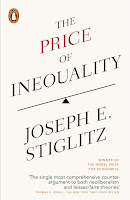 Staff Review by Chris Saliba
Staff Review by Chris SalibaNobel prize winning economist Joseph Stiglitz’s The Price of Inequality is essential reading for anyone interested in finding out why such huge inequalities of wealth persist.
Joseph Stiglitz is an American economist and winner of the Nobel prize. In The Price of Inequality, the professor of finance and economics examines the growing inequality within American society. He especially looks at how America’s right-wing political culture has had a pernicious influence on how the country’s economy is taxed and regulated. In essence, policy makers are “cognitively captured” by the prevailing free market, small government ideology. What this means is that such neoliberal ideas have become so culturally ingrained that policy makers and politicians can’t think their way out of the current system.
Big business also carries far too much power in getting the legislative programs it wants implemented. Stiglitz vigorously argues that these powerful interests are more rent seekers than innovators of new products and services. Massive rents are accumulated by big business in the form of generous tax breaks and inflated prices for government contracts. The way Stiglitz paints it, America seems almost like a kleptocracy, with huge amounts of wealth rising to the top. Indeed, once you belong to the top one percent of the American population, it’s like having a virtual licence to print money.
This is one gloomy book. American society, with its shocking and unnecessary disparities in wealth, sounds excessively mean. To make matters worse, there is the American health care system, with its glaring inefficiencies and waste. Many Americans have poor health coverage and simply cannot afford to get sick. Another big problem is the erosion of middle-class wages. In real terms, they’ve actually gone backwards over the last 30 years. What makes The Price of Inequality such a despairing book is that the politics around economic decision making appears to be so intractable and difficult to change. There are too many vested interests with too much to lose. The irony is, such pronounced inequality can only have negative effects on the country’s economy: eventually no one will have any money to buy anything. Even bigger problems loom with inequality ripping up whatever’s left of the social fabric. Unpleasant revolutions are born of such gross economic dispossession.
There are plenty of reasons why Australians should read The Price of Inequality. It shows what can happen when you allow tax and regulatory arrangements that unnaturally favour business and the rich. Once such laws are in place, they’re very hard to change.
One of the standout features of this book is Stiglitz’s ability as a clear communicator of complex ideas. He explains in simple and accessible language what’s gone wrong with the American economy. He talks not just about the dollars and cents, but explains how power and ideology work to create such unfair outcomes. This is a book with a great sense of urgency and purpose. If you found Thomas Picketty’s Capital in the 21st Century too intimidating, then The Price of Inequality is a good place to learn how power and inequality perpetuate themselves.
The Price of Inequality, by Joseph Stiglitz. Published by Penguin. ISBN: 9780718197384 RRP: $22.99
To sign up for our monthly newsletter, featuring new releases, book reviews and favourite articles from around the web, click here.
No comments:
Post a Comment